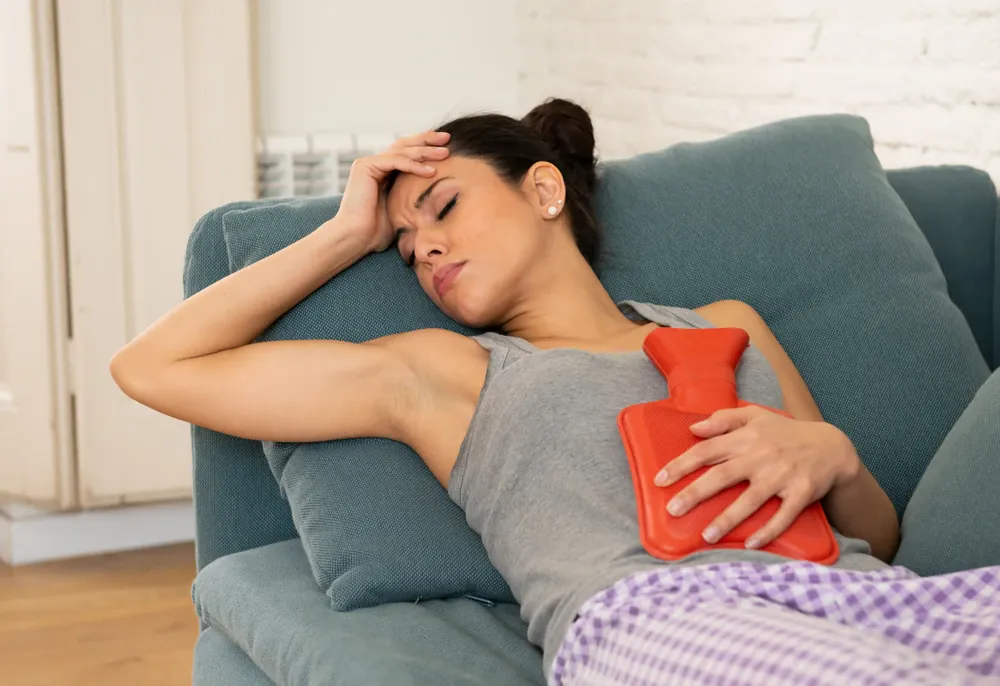Many women suffer from several annoying symptoms during the period that precedes their menstrual cycle, which is a normal thing that many women face and affects differently from one woman to another, as the symptoms vary and vary in severity and timing, which is known as premenstrual syndrome (PMS). These symptoms include various physical and emotional changes that can significantly affect a woman's quality of life.
In this article, we will discuss in detail premenstrual symptoms, and try to identify them and learn how to deal with them as they represent an important part of women’s health. We will provide some advice on how to understand them and mitigate their severity.
Why do premenstrual symptoms occur?
Premenstrual symptoms occur due to many hormonal changes in the body in preparation for the start of menstruation. These changes include decreased levels of estrogen and progesterone and increased levels of prostaglandins. These changes affect the chemical balance in the body, causing many symptoms before menstruation. These hormonal changes affect many body systems, and the rise and fall of hormone levels may affect the nervous system, which increases feelings of sensitivity, pain, headache, and fatigue, along with noticeable changes in mood and behavior.
What are premenstrual symptoms?
Premenstrual symptoms vary from one woman to another and can vary in severity from mild to severe. Some common symptoms include the following:
Physical symptoms:
- Severe pain and abdominal cramps: This is the most common symptom, and occurs as a result of uterine muscle contractions, resulting from hormonal changes in the body.
- Abdominal bloating: This is due to fluid retention in the body.
- Breast pain: Pain or stiffness may be observed in the breasts, as a result of changes in hormone levels.
- Fatigue and exhaustion: Feeling exhausted and exhausted is also a common symptom before the start of the menstrual cycle, due to hormonal changes and low blood sugar levels, which affects the quality of sleep.
- Fatigue and exhaustion: Feeling exhausted and exhausted is also a common symptom before the start of the menstrual cycle, due to hormonal changes and low blood sugar levels, which affects the quality of sleep.
- Headache: This is due to hormonal changes and mood swings.
- Constipation or diarrhea: This occurs as a result of changes in the digestive system.
- Acne: Acne may appear during this period due to hormonal changes.
Emotional symptoms:
Due to the hormonal changes that the body faces during this period, you may experience some of these symptoms:
- Frequent mood swings.
- Feeling nervous and angry quickly and easily.
- Feeling depressed or anxious.
- Loss of concentration.
- Continuing to feel like crying.
- Insomnia and difficulty sleeping.
- Feeling emotionally hungry.
How can we alleviate premenstrual symptoms?
There are many things that women can do to relieve premenstrual symptoms, including the following:
1. Lifestyle changes:
- Exercising regularly: Light exercise, such as walking, helps improve blood circulation, improves mood, and relieves feelings of tension and pain.
- Commitment to a healthy diet: The usual diet should include plenty of fruits, vegetables, and whole grains.
- Get enough sleep: Sleep helps regulate hormones and improve mood, and also helps reduce feelings of fatigue and exhaustion.
- Reducing stress: Practicing relaxation techniques such as yoga or meditation can help reduce stress.
2. Medicines:
- Painkillers: such as ibuprofen or paracetamol may help relieve abdominal pain and headache.
- Oral contraceptives: They help regulate hormones and reduce premenstrual symptoms.
- Antidepressants: They help treat symptoms of depression and anxiety.
- Reducing salt: Reducing the amount of salty and sugary foods consumed, and processed foods, especially salted ones, due to their role in the body’s ability to retain water, as these substances usually exacerbate premenstrual symptoms.
- Avoid caffeine: You should limit the consumption of drinks that contain caffeine, such as coffee and chocolate.
- Drink plenty of water: Water helps improve premenstrual symptoms.
- Taking nutritional supplements: Taking supplements, such as vitamin B6 and magnesium, can help relieve premenstrual symptoms.
3. Alternative treatments:
- Herbal treatment: Some studies indicate that herbal drinks, such as ginger and wild mint, can help relieve premenstrual symptoms.
- Acupuncture: Some people believe that acupuncture can contribute to alleviating premenstrual symptoms.
- Cognitive-behavioral therapy: Cognitive-behavioral therapy can also help in knowing how to deal with emotional premenstrual symptoms.
_ About pain resulting from menstrual cramps, drinking hot liquids, taking a warm shower, and lying on the back with the legs slightly raised on a pillow, is helpful. Sleeping on one side in a manner resembling a fetal position, with the knees bent, is also helpful in alleviating pain caused by menstrual cramps. the pain.
When should you consult a doctor?
You should consult a doctor for necessary medical advice if premenstrual symptoms are severe or negatively affect your daily life.
note:
It is important to talk to your doctor about any new or unusual symptoms you are experiencing, so the doctor can help determine whether these symptoms are due to premenstrual syndrome or another medical condition.
Many women suffer from premenstrual symptoms, which is a normal part of a woman’s life, but fortunately, there are many ways to alleviate these symptoms and improve the quality of life for the better, by understanding the hormonal changes that occur within the body during this period and following a lifestyle. Be healthy, and take medications when needed. Many women can easily live with premenstrual symptoms, so let us make these symptoms an opportunity to connect with our bodies, celebrate our ability to reproduce, and prepare to receive the menstrual cycle with a smile and a more comfortable feeling.
Always remember that you are not alone and that there are many solutions available to alleviate these symptoms and improve your quality of life.
Enjoy the beauty of your femininity, and live every moment to the fullest
 English
English
 العربية
العربية


Comments
انا متزوجة سنة واسبوعين ولسه لم يرزقني الله أولاد ، اولا اولاد بيد الله ولكن يقول الله سبحانه وتعالى في محكم تنزيله ( فسائلو أهل ذكر إن كنتم لا تعلمون )
أشعر ألم كثير أثناء دورة الشهرية أكثر من قبل أن كنت فتاة غير متزوجة .وسمعت ان لازم تتغير حالة أو مدة دورة شهرية بعد أن تتزوج المرأءة وأن تتعافى بها على أقل ٢٠% ، ولكن أنا ما في شيء تغير بعد زواجي بل زاد مني أبم دورة بعد.زواجي.
ربما في تغيير دورة شهرية وممكن الشيء الدي يمنع أن انجب اطفالا هي هذه مشكلة .
اذن أريد دكتور متخصص بهذا الأمور؟
ممكن أجد عندكم ؟
Add New Comment